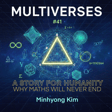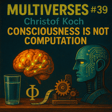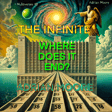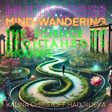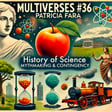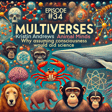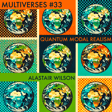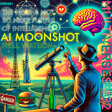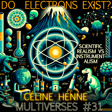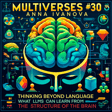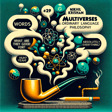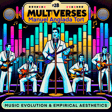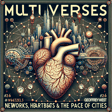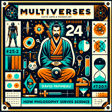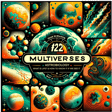Introduction to Thought Experiments and Science
00:00:00
Speaker
Empirical experiments are clearly key to science. You think of a hypothesis, you test it, you learn something about the world. But spare a thought for thought experiments. Our guest this week is Hal Vilsher. He's a philosopher at the University of Lindshöping in Sweden, and thought experiments are the starting point of our discussion.
00:00:17
Speaker
We talk about what thought experiments are and what they give us. Do they lead us to new knowledge about the world or are some thought experiments more geared towards providing us with understanding of the physical theories that we've already developed? That's something that we discuss in a bit more detail. And we talk also about how understanding seems to have been a little bit neglected in the analytic tradition of philosophy. In contrast to the continental tradition,
00:00:46
Speaker
The analytic tradition seems to concern itself more with the problem of knowledge, what is knowledge and justification. So how it provides a really nice perspective on how to think about understanding itself, what understanding is.
Purpose and Role of Thought Experiments in Science
00:01:00
Speaker
We end up having a pretty wide-ranging conversation talking about where thought experiments have gone wrong, how we can think of science fiction as a thought experiment. We talk about the mathematicisation of science under Galileo or with Galileo in the 16th century.
00:01:16
Speaker
and we talk about the value of transcendental arguments.
00:01:21
Speaker
So there's a lot going on here. And if I'm forced to give it a single theme, it's something like this. There's a lot more to the scientific method than induction. In fact, I'm not really sure there's a scientific method at all. There's a lot of different tools going on. And here we talk about some of the other ones that are worth paying attention to. I think it's really interesting to get the perspective of someone like Harold who bridges the
00:01:47
Speaker
continental and the or phenomenological and the analytic traditions. So I had a lot of fun, I learned a lot of things, I hope you do too. I'm James Robinson, this is Multiverses.
00:02:17
Speaker
Harold Vulture, welcome to Multiverses. Thank you so much for inviting me. It's a pleasure. Brilliant. So I want us to start by talking about Ford Experiments. I came across a paper of yours from a couple of years ago where
00:02:38
Speaker
What was quite interesting to me is I've often thought about for the experiments within philosophy, but you kind of introduced how thought experiments are used in science fiction or how one can think of science fiction as performing a similar function. But perhaps you could get us started just by giving your take on what thought experiments are.
Hal Vilsher's Journey and Insights
00:02:58
Speaker
What is it that they do for us? Yeah.
00:03:02
Speaker
Yeah, thanks so much for the question. I mean, actually looking back at my career, thought experiments were quite important because it was actually my first international postdoc at the University of Toronto, where I had the pleasure to work with Jim Brown, who's one of the, you know, very notorious people advocating a very, very strong Platonist take on thought experiments were basically thought experiments really allow you to directly inspect
00:03:28
Speaker
the laws of nature. And he has this story about how Gileal really saw the law of falling bodies by pulling off his tower for experiments and these kinds of things. And so I was a post-doc at the University of Toronto and there were quite a lot of people working on for experiments. And I guess how I personally got interested
00:03:48
Speaker
in these wild creatures in scientific methodology was, you usually hear this standard story about how science is...
00:03:59
Speaker
based on experiments and observation and experiment and these kinds of things. But then all of a sudden you open up certain science textbooks, certain physics textbooks, and I don't know the way how people learn special relativity, for instance. I mean, you know, the first steps are photo experiments. It's kinda, and it makes
Philosophical Perspectives on Thought Experiments
00:04:19
Speaker
you wonder. So why, why, why do we need them? What, what, what do they actually do? And coming back to this paper of mine, you're referring to
00:04:30
Speaker
After I kind of made my way into the discussion about thought experiments, at some point I was actually quite surprised that most people discussed thought experiments really with a view on a question about knowledge. So basically for many people, the argument basically runs science is about producing knowledge about the world.
00:04:54
Speaker
In the vast majority of cases, this is being done through experiments observation and these more conventional methods. But then you also find thought experiments. They are part of established scientific methodology. So we should accept that they are there because scientists are using them. But then how are they contributing to the production of knowledge with the assumption that science is about producing knowledge and exclusively so.
00:05:21
Speaker
And then you have different views on that. You have someone like John Norton, who basically says, well, you know what? Thought experiments just look so fantastic and mysterious in reality. It's just arguments. Because that's, of course, the other way how you can, from certain premises, come to certain conclusions. But there isn't anything mysterious about it. We know how logic works. And this would be one of the explanations. And then you have someone like Jim Brown, who says, no, no, no, no, no.
00:05:51
Speaker
underestimating how mysterious these things really are. And, you know, Jim Brown is a Platonist in mathematics. So he really carries this general idea of Platonism that there are abstract entities out there that really do exist. Not in physical space and time, but they are really out there. And then he connects that really to scientific methodology by saying, well, there is the third eye of intuition and thought experiments.
00:06:20
Speaker
allow you to directly inspect the laws of nature. Building on a certain idea, this threads key to the account of what the laws of nature are, but he really adds this epistemic bit that you really can inspect them. No one believes that except Jim himself. I really admire his ability to defend this position over, I don't know, 30 years or so.
00:06:43
Speaker
I wonder if there's people like maybe Tegmark or something who have this very played in it, might kind of follow in that trajectory. So maybe his influence has gone sort of outside of philosophy in ways that are, you know, a little bit hard to trace. I mean, you're right. I mean, there are mathematical monists, but I would say in the case of Tegmark, the argument would be a very different one. I mean, it's, it's basically an adaptive, abductive argument
00:07:10
Speaker
in the face of the unreasonable effectiveness of mathematics. And then basically just saying, well, maybe a fear is a mathematics approximating mathematics. And then there is really no, no, no mystery there. But I'm not sure if Tecmak ever talks about thought experiments. I haven't seen him because my impression would be that I haven't met a lot of scientists actually who take
00:07:36
Speaker
thought experiments very seriously, especially not in discussions about knowledge production. And I think to a certain extent, this is also what happened in my own thinking about thought experiments. At some point it was really like, okay, so you have a bunch of philosophers discussing if thought experiments are part of this enterprise of generating knowledge. And then you have people saying yes and people saying no, but actually,
00:08:05
Speaker
Is it really about knowledge? Isn't what thought experiments do something else entirely? And isn't that also epistemically interesting? Because to kind of make a long story short, the idea in this the Forever War paper was that what thought experiments do mostly is generating understanding. So they
Understanding vs. Knowledge in Science
00:08:31
Speaker
cognizing subjects to understand what's happening with regard to a certain theory, how we are supposed to make sense of certain empirical situations. And this is really where thought experiments are very useful. And the thing is, there is a tradition, and I really think it goes back to logical empiricism, basically, where understanding isn't taken seriously at all as far as epistemic concerns.
00:09:01
Speaker
are relevant. So people would just say, yeah, understanding is nice, you know, it's this psychological feeling of all of a sudden having this eureka moment, you know, aha, now I understand, but that's just psychology. This is just, you know, neurons firing in this or that way, but it has nothing to do whatsoever with what philosophy should be concerned about, namely justification.
00:09:25
Speaker
logic, you know, these kinds of things. So you have a very strict separation between, on the one hand, knowing how the world looks like, and then you know, the bits and pieces of logic and justification or maybe probability theory, you need to figure these things out. But understanding is just it's just a feeling. It's just psychology. And I, I think I grew increasingly skeptical when it comes to this
00:09:55
Speaker
viewpoint in general, not only with regard to thought experiments, but more generally, really also thinking about science. And of course, then there is a question to be asked, what is the relation between knowledge and understanding? Are they completely disconnected? Or is there a connection there? So can you really understand something without thereby also having knowledge about the target system? And all of these details, of course, need to be figured out.
00:10:20
Speaker
I do think understanding is an important epistemic virtue when we're talking about science in general. And in this thought experiments paper, I wanted to, first of all, get a little bit clearer on what I think understanding is, and second of all, how it plays a role both in thought experiments and, and this is the other part, in science fiction literature.
00:10:43
Speaker
Yeah, some really interesting things to go over here. Firstly, I think, as you say, there's been a lot of discussion of the groundbreaking thought experiments, which kind of lead us to new paradigms, I guess. So Galileo and his boat, there's Galilean relativity, Einstein thinking about elevators falling, and there's general relativity.
00:11:13
Speaker
you know, clearly those are really important moves that one can argue are knowledge producing, although perhaps, you know, it's not a complete laboratory of the mind, it's more an argument, which is, you know, drawing on principles that are grounded in lots of observations. However, it's also the case that probably most of the thought experiments that one encounters are in textbooks and in lectures, and they're just about
00:11:43
Speaker
I think, as you say, passing on an understanding of the theory and giving people that ability to actually manipulate their knowledge, I guess. And I think I agree as well that, to my mind, understanding does seem under-addressed in certain areas of philosophy. And the quote that comes to mind is, I think it's Simon Critchley who said something like,
00:12:14
Speaker
One of the ways of characterizing the spirit between analytic and continental philosophy, very, very difficult thing to do, is that analytic philosophy is more focused on knowledge and continental more on wisdom, I guess. And wisdom kind of links into that understanding part. And we should say here for people who are less familiar with your work that
00:12:38
Speaker
You somewhat straddle those worlds, but you're a phenomenologist, so you're kind of within the continental tradition, I guess. Much as one doesn't really like that terminology, it's sort of the best we have ever. So yeah, I feel like let's talk about this some more. So what is it? I mean, can we characterize what it is, understanding, and how it differs from knowledge? Big question.
00:13:09
Speaker
Yeah, I would say that understanding, and this is, by the way, also how I would think about a lot of what phenomenology brings to the table. So sometimes people ask me, so when they see that some of my work, as you mentioned, is partly in this tradition called phenomenology, and then they're reading a couple of things. And then usually, especially people in lytic fields would be, for instance,
00:13:37
Speaker
more familiar with, for instance, pragmatism and William James, and they would ask, oh, some of that stuff sounds like, you know, William James, and I would say, yeah. I mean, honestly, I don't think that the differences between someone like Edmund Hussle and William James, I mean, of course, there are differences in detail. But I think what these two traditions kind of share is
00:14:00
Speaker
A very practical approach, like also how I would spell out understanding. Basically for me, it would be the ability to display the right kinds of operations or actions given the kind of target system you're concerned with. To give you a concrete example, like I would say that my car mechanic clearly understands how an engine works.
00:14:26
Speaker
How do I know? Well, whenever I go with my old motorbike and say, look, it's again not working, something's wrong, and I can't do it, he clearly knows what to do. And he clearly displays the right kinds of operations in order to fix the engine. So that makes me very confident that my car mechanic actually understands the engine. He understands the part, knows how to rearrange them. He knows what to do in order to fix it.
00:14:57
Speaker
Now, I would say displaying or the ability to display the right kinds of actions given the situation or the target system you're concerned with is the first step for what you need in order to say that I do understand something. And by the way, it doesn't have to be, if I'm talking about operations or actions, it doesn't always have to be your hands moving, tools using for this or that, it could be a mental operation. Like, how do we know that someone understands arithmetic?
00:15:26
Speaker
Well, because the person knows how to manipulate the equation in the right kinds of way and move the symbols back and forth. And this is exactly how we would say we can determine if someone understands or doesn't. But then there is, I think, a second component, because I think that's quite important. And going back to my example of the car mechanic,
00:15:48
Speaker
I would say my car mechanic understands the engine because he or she can use the right kinds of tools in order to fix the engine. Now someone could say, well, Harald, that doesn't sound very convincing because assume I just simply take the tools of your car mechanics. I steal all the tools, then he can't or she can't fix the engine anymore. Does that mean she just or he just lost?
00:16:14
Speaker
the ability to understand the engine because he or she doesn't have the tools anymore. And I would say, no, of course not, because my car mechanic could still do the right kinds of operations offline, so to speak. And this is the second part of what I would say is necessary in order for you to have understanding.
Historical Ties Between Mathematics and Science
00:16:33
Speaker
You need to be in a position to build a mental representation of the target system you're interested in. And any operations could even be done offline.
00:16:44
Speaker
And I think you could even turn this into some kind of test, for instance, you know, as academics were sometimes concerned with the not very pleasant enterprise of figuring out whether students really understood something or are just, you know, faking understanding and have just learned certain operations. Like you give someone, you know, an equation to solve. And then the question is, well, did the student really understand or have they just memorized there are kinds of steps?
00:17:10
Speaker
I mean, by changing the target system slightly or by making the student create their own mental representation of just a similar problem and then displaying certain operations is a pretty good way to figure out if someone has really understood something. I mean, a problem I recently started to think about is how chat GPT would actually do based on that understanding of understanding
00:17:38
Speaker
I'm actually forced to say that chat GPT does understand, which I'm not sure I would be very happy with, but I haven't done my thinking. So please don't grill me on that. Yeah. No, I'm tempted to chat the GPT on some of these thought experiments myself. So then understanding is
00:18:03
Speaker
the ability to deploy knowledge to do things backed up by mental models. So what is it about Ford experiments that
00:18:16
Speaker
so useful for producing this. Why can't we just give someone, for example, the Lorentz transformation, or the equations of special relativity, or the equations of general relativity, and say, hey, here's like some, you know, tell me how much this rod is gonna contract if I, you know, zoom it off in a rocket or something. Why do we still, why do we give students the
00:18:44
Speaker
these thought experiments and not just the equations? Yeah, that's a very interesting question. I think to a certain extent, it's also a, in a way, very personal question for me on several different levels, because for one thing,
00:19:05
Speaker
I think if you were to ask me what the deepest riddle about science is in my overall thinking about trying to understand what science is from a philosophical point of view, in that regard I would consider myself to be a very traditionally minded philosopher.
00:19:22
Speaker
then i would say what puzzles me about science is really the connection between reality whatever reality turns out to be in the end and mathematics so what is it about this link between these two things so why all of a sudden and i have to say at my previous institution i had this double affiliation
00:19:42
Speaker
the philosophy department and the history of science center so I also did some history of science teaching and research and especially on early mechanics and kinematics in the 17th century and what's so interesting about it I mean someone like Leo and I know the historical story in all its glorious detail is a little bit more complicated but that than that but you know you have someone like Leo
00:20:06
Speaker
suggesting a completely new way to do science. I mean, of course, people use mathematics to describe a phenomenon in nature before that as well. But Gileo was the first one to say, well, we're not supposed to only do it up in the skies, we need to do it everywhere with regard to everything. And if you don't do it, you will not be able to read a God second book, which is just reality around you with coming back to tech, which is mathematical in nature. But you have to move
00:20:35
Speaker
And all of a sudden, science starts to fire on all cylinders. And then wherever you look, people learn how to apply mathematics to describe reality. Science starts to take off, first in physics, then in other areas. Curiously, in certain disciplines, it doesn't seem to work with that high of a degree of efficiency. But in general, I think there is something about this link, which is
00:21:02
Speaker
Yeah, a boost for whatever science is up to. And I think this is a deep philosophical problem. Now, how is this related to thought experiments? Well, there is one curious thing about mathematics. You sometimes see an equation.
00:21:21
Speaker
And you might even have the mathematical skills to be competent with manipulating the equation itself. You know how to move the symbols around. You know what you can do in this mathematical space. But you might not have the slightest idea.
00:21:38
Speaker
what the symbols actually are supposed to refer to. Is this economics? Is this population biology? Am I looking at Lotka-Volterra equations describing fish in the pond and fishermen trying to catch those fish? Or is it quantum mechanics? Sometimes there might be a situation where you can deal with the math without knowing what the math is supposed to refer
Einstein's Thought Experiments and Relativity
00:22:08
Speaker
Also in didactics, when you learn physics, I mean, look at how physics textbooks or university curricula build. I mean, first of all, you try to get a certain amount of mathematics under your belt, just mathematics per se.
00:22:22
Speaker
And then basically, you start dealing with the physics. But I think one of the crucial problems, which is also the reason why every physics student always starts with the same little toy examples where you have trucks sliding down heels. And then you say, yeah, you can assume there is no frictional effect, yada, yada, yada. Why everyone is doing the same is I think this is exactly the stage of learning physics.
00:22:51
Speaker
where you start the very challenging task to create co-ordinations between the empty formalism of mathematics and the kind of target system this piece of mathematics is supposed to be about. And this is all the word thought experiments are really good. And look, for instance, at some of Einstein's thought experiments. I mean, basically, this train experiment, for instance, where he
00:23:20
Speaker
has basically one train going on a train track and then the whole thing about the thought experiment is to one time you're an observer at the side of the train track and you have two light flashes and you see where the light flashes are meeting and the second time you're an observer on the train moving along with the train. The only thing here is you to get used to using certain
00:23:46
Speaker
a certain terminology to talk about events and the temporal order of events in a way that at the beginning is very counterintuitive. So what does counterintuitive mean? Well, it's just counterintuitive in relation to the way we normally speak.
00:24:02
Speaker
Special relativity requires you to talk very differently about events and temporal order and all these kinds of things. And the thought experiment really helps you, on the one hand, to take certain notions which are weird, or in some cases, mathematical formalism, which is per se empty, semantically not specified.
00:24:20
Speaker
And then the thought experiment allows you to start this kind of mapping. And I think a lot of this has to do with being able to pull off the right kinds of mental operations to build concrete scenarios in your mind that connect the mathematics with the target system you actually want to talk about. Yeah. I think the train one is a great example because it's a thought experiment that
00:24:48
Speaker
Anyone can understand whether they have any knowledge of physics or not. You just need to accept that light always travels at the same speed. So there's this person in the middle of a train. He sort of lights up a light bulb and that light travels out at a finite speed.
00:25:05
Speaker
hits one end of the carriage and the other end of the carriage at the same time, according to that guy in the middle of the train. But then if you watch it from the edge of the bus beside the train tracks, well, because the train's moving, the light has to take a longer path in one direction, sort of traveling backwards than in the other. And so you don't see it as being simultaneous. And it just completely breaks down this very, like you say, introduces this very counterintuitive idea that
00:25:35
Speaker
simultaneity is relative. And it makes that concrete in a way that it's very hard to get from the equations.
00:25:44
Speaker
I think one example, another one, talking of Einstein, that I find really interesting here is the sticky bead thought experiment. So to kind of summarise this, well, Einstein, after General Relativity, sort of first predicted that there would be gravitational waves.
00:26:06
Speaker
And then he flip-flopped on this because Eddington said, oh, no, this is just like these gravitational waves that you're talking about. They're just a kind of ripple in the coordinate system. And Einstein bought that. He was like, oh, yeah, no, they're not interesting. They're not real.
00:26:25
Speaker
decades later, Feynman came along and said, hey, let's say there was still a debate going on about this and Feynman said, what happens if you have some beads on a rod, right? And there's a gravitational wave that comes along.
00:26:41
Speaker
And these beads are kind of sticky. Do the beads feel any friction? Do they start moving and transfer some energy to the rock? Because if they do, then there's clearly something going on here that's not just a coordinate shift. And people thought about this and they're like, oh, yeah, this is true. I mean, even expert physicists, Einstein himself, it can be hard for them to figure out, to apply the knowledge of their own, put their equations into action and see where they touch reality.
00:27:11
Speaker
That's just kind of stunning to me that that that happened right and it makes me wonder what else are we missing on that? You know other places were misapplying theories
00:27:20
Speaker
No, completely, I agree. And with regard to Einstein, I mean, and of course, one always has to be quite cautious with this kind of speculative reasoning. But I wondered a couple of times whether there is also a relation between, you know, when people say that Einstein had this, you know, really excellent physical intuition on the one hand, but when it came to mathematics, actually, you know, reached out
00:27:48
Speaker
for help from some of his more mathematically gifted colleagues, Herman Weil and others, whether there is a connection that you find so many wonderful thought experiments in Einstein's thinking if there is a correlation to his maybe
00:28:08
Speaker
not perfect mastery of the mathematical details that, you know, the thought experiments almost were a little bit the substitute for perhaps what he lacked with regard to to to mathematical specialization. But yeah, that's really speculative. Yeah, we know what to say that he was bad at mathematics. He was clearly very, very gifted. But but I think you're right. I mean, and he turned to nothing. I mean, no one knew how to figure out some of the
00:28:36
Speaker
how to do the differential geometry that he needed for general relativity. So, you know, Nurther and Varn and others sort of help with that. But I think it's also one of the things that is sometimes suggested about the EPR paper, where he argues that quantum mechanics is incomplete, that he wasn't, it was kind of overly mathematically sized.
00:29:01
Speaker
And he lost his way a little bit. And later, the conclusions of that paper were found to be incorrect, basically. I mean, they're still debating around this. But certainly, like, yeah, it does feel like he was playing to his strengths when he was grounding himself with thought experiments.
00:29:25
Speaker
Yes, no, absolutely. And I think this is an important one.
Newton's Bucket and Mach's Influence
00:29:28
Speaker
I mean, the EPR is also a very clear example of no matter what you think about a thought experiment at a given time. I mean, basically with one respect, it's just like every other part of scientific methodology, it's highly fallible. And you might have thought experiments, which at one point in time really seem to suggest one outcome very, very clearly and historically also.
00:29:53
Speaker
think of, for instance, Newton's bucket experiment that convinced a lot of people at the time of a very specific view about the nature of absolute space, for instance. And then you read Ernst Mach, basically carrying the whole board experiment around. And all of a sudden you think, oh, yeah, well, yeah, sure.
00:30:11
Speaker
Why didn't I have thought about that? So, I mean, no matter where you stand. Sorry, I just I mean, I love the bucket experiment, we've actually discussed it already with with with Julian Barber. But even for people who've already heard that discussion, I think it's worth just going over what that experiment is, because it's just an absolute classic. And you're right, it sort of shows that you can
00:30:36
Speaker
The danger of thought experiments is you can get it wrong, right? You don't actually run the experiments because they're so abstract. So maybe if you just outline how the bucket experiment works and what Leibniz and Newton thought and then what Mark said.
00:30:52
Speaker
Well, I mean, basically you have the situation where you have by stipulation an empty universe and then you have a bucket dangling down a rope. And the first thing here is never ask where the rope is actually tied to an empty universe. I think that should give you a moment to pause and think. But then basically you throw the bucket around and you let it go and then you perceive.
00:31:19
Speaker
the surface of the water in the bucket and you see it going through different stages and at one point it's concave and one point it's flat. And also a huge part of it is of course the relation between the surface of the water in relation to the walls of the bucket. And then basically the question Newton asks, I mean, in an empty universe, you have a non-correlation between the rotational motion of the bucket and the surface of the water.
00:31:48
Speaker
So whatever the surface of the water is relative to cannot only be the walls of the bucket. So what else could it be in an empty universe? So the only thing left basically is absolute space. Hence, there is a situation imaginable where you have a system that causally reacts to only one thing left, namely being absolute space. That is basically the line of reasoning. Yeah.
00:32:18
Speaker
just to make it crystal clear. It's because before the bucket starts spinning, the water is flat. And the water is not moving relative to the bucket. So there's nothing going on there. After you start spinning it, water initially is maybe rotating a bit relative to the bucket. But it reaches a steady state where it's not rotating relative to the sides of the bucket. But the shape of the surface has changed.
00:32:46
Speaker
it's now curved. So how would you explain that? Like, what is it moving relative to? And as you say, the answer for, you know, back then was, well, it's moving relative to absolute space because we've taken everything else out of this universe. So what else could it be? So yeah, so then, yeah, what was Max response to this when he heard it? Yeah, I mean, this is an interesting one. And maybe this already also leads us over to one of my favorite topics, namely,
00:33:12
Speaker
phenomenology because the way I read the last 150 years of history of philosophy, the phenological movement actually starts with Ernst Mach. I would really consider him to be the first proto-phenomenologist. So what does that mean before I come back to the thought experiment? Well, I think Mach took the idea that
00:33:38
Speaker
science starts and ends with experience and that we should take experience very very seriously and that we should also always be quite cautious how we think about the scope of our
00:33:53
Speaker
inferential machinery, he took that very seriously. And I think this is really something that carried over into phenomenology, that you have this very, very strong respect for the phenomena. And I mean, basically coming back to the bucket thought experiment, I mean, basically what Mach is, I mean, if you read it closely, his analysis of these thought experiments, I think it's a dual strategy. So first of all, it's really saying, look, if you
00:34:23
Speaker
hyper-idealize a situation in thought in a way Newton does, it becomes completely unreliable. I mean, you can basically dream up any kind of scenario and then deduce any kind of conclusion, whatever you want from such a situation. So this is simply not what we're supposed to do in science. And second of all, there are
00:34:46
Speaker
alternative explanation. So if you don't make this hyper-idealizing move of simply abstracting everything away from the universe, then I mean, of course, there are the fixed stars left. And I mean, that is your frame of reference to which you can actually explain what's happening with the bucket. But the thing about, and I hope it's okay if I
00:35:10
Speaker
drag the discussion now a little bit in that direction. I think this general idea in Mach that there is a certain danger of having certain well-proofed inferential methods and then we carried them over in new areas of inquiry and we kind of
00:35:37
Speaker
lose track a little bit of the kinds of conclusions we take from these inferential machinery and assume certain things were actually were moving away from experience too far and were not truthful to the phenomena anymore. I think this is really a general topic that is very strong in Mach, but really also carried over to Hussen. And interestingly Edmund Hussle, and I'm not sure how familiar people, especially in analytic circles, are with that name. I mean he's usually referred to as the founder of the
00:36:07
Speaker
phenomenological movement. And then, you know, the story usually goes well, and phenomenology then was the starting point for what later became the continental tradition. And as we all know, continental philosophers are not interested in science and they're generally, phenomenologically not very precise. And we never quite know what they're saying and, you know, these kinds of things. But I think Hussle is historically a very interesting character because, I mean, on the one hand, I had so many stories to tell.
00:36:34
Speaker
Bertrand Russell had one book with him in prison during World War I, and that was Husser's Logical Investigations.
00:36:44
Speaker
So there were strong connections between what Husserl did and how he was perceived. Also, of course, between Frege. Frege wrote a referee report on Husserl's first book on mathematics and basically accused him of being a psychologist, which Husserl took very seriously and was really the starting point for his criticism of psychologists later in logical investigation. So there are close historical connections and also with Mach.
00:37:14
Speaker
1923, Husserl gives a lecture in Amsterdam and basically says at the very beginning, look, the term phenomenology comes from Mach's usage of the notion of phenological physics.
00:37:31
Speaker
And as you might know, physicists in this very day still talk about phenological laws, for instance. What is a phenological law? It's, for instance, Snell's law. It just gives you a mathematical description.
00:37:45
Speaker
of the angles of a wave going through isotropic media. A light ray goes through air and then through water, and then you have a change in the angle. And Snell's law just describes this correlation. But what Snell's law does not do is to give you a kind of a deep explanation. It doesn't give you a view of what's happening under the hood of this correlation between the angles of the light ray.
00:38:08
Speaker
And this is what we mean with phenomenological law. And to make a very complicated and philosophically invested story short, Mach's idea was that physics should be as phenomenological as possible in that sense. But Husserl took also the inspiration for calling this whole project phenomenology from Mach. This is also something he says in the Encyclopedia Britannica article when he writes about Husserl himself writing about phenomenology and saying,
00:38:39
Speaker
Well, Mach is the source where I took the main inspiration and I think of my project as a philosophical radicalization. And I'm mentioning this, I know this is not a history of philosophy podcast, but I'm mentioning this to show also
00:38:54
Speaker
People sometimes really like to think in these, you know, clear categories. Here is analytic and then on that's Quine and that's Salas and Putnam and these guys. Well, the late Putnam might already be tricky. And then you have continental philosophers and there we have, I don't know, Riker and Derrida and Szyczyk and whatever. And it's clearly democated. I mean, historically.
00:39:16
Speaker
situation, first of all, is much more complicated. And I think also if you look at the actual work that's being done, the situation isn't so simple either. And Machin-Hussel and his connection, for instance, is a very interesting one historically.
00:39:31
Speaker
Yeah, I was not aware of that. That's completely fascinating. And by the way, this is like an anything interesting goes sort of podcast. So the history of the philosophy of science is certainly a fair game as a hunting ground.
00:39:48
Speaker
Yeah. Wow. So phenomenology took its title from Mark.
Philosophical Approaches in Science
00:39:58
Speaker
Yeah. And I completely agree as well that, I mean, there's a lot more intersections between the continental and analytic traditions than
00:40:11
Speaker
one is perhaps led to believe just studying uniquely in one of those traditions. And if I might comment on your papers,
00:40:20
Speaker
the sort of stereotypical view from analytic philosophers, oh my goodness, these continental philosophers are just impossible to read. It's just like, but that's not at all the case. I mean, I think, you know, I would invite listeners to go on your website, just Harold Viltra. If they type that in, they'll find you and you have your papers there and they're very, very easy to understand and entertaining, I might say.
00:40:49
Speaker
So, I don't know what my next question is, but I do find this is like, this is something that is perhaps. I mean, maybe I can chime in with, I mean, honestly, and this is like, why, I don't know.
00:41:08
Speaker
Well, we're at minute 38. So I think 30 minutes ago, I mentioned that one of your questions had a kind of a also kind of autobiographical touch for me. And I think one thing I thought about 30 minutes ago now comes up again, because I should mention where we're starting talking about the relation with analytic and continental and how phenomenology I think could be of use also in philosophy of science, in mainstream philosophy of science these days.
00:41:36
Speaker
I mean, personally for me, I studied as an undergraduate student, I would say, at a violently analytic department. I mean, I think the first three mandatory courses we had were formal logic, and it was really that kind of education I originally had. But then, especially thinking about science, I remember
00:42:00
Speaker
An eye-opener for me was reading Ernst Kasira on relativity theory and especially his take on what covariance is. And this idea that you could apply a certain transcendental thinking on scientific theories and that you could try to make sense of what scientific theories and models do from a standpoint that does not automatically assume that what a mathematical model is is just a representational vehicle
00:42:28
Speaker
of some empirical target system. One of the questions you have to solve is what is the relation between the mathematical model with regard to the target system? Are we talking about similarity, isomorphism, partial isomorphism? What exactly is going on there? I think what you can take from some of the
00:42:49
Speaker
continental approaches out there, and this could be neo-cantianism, this could be phenomenology, this could be a couple of others, is I think this attempt to maybe question this basic assumption that when we think about science, we always think about mathematical models, or most of the time we think about mathematical models as these representational vehicles that kind of try to establish a connection
00:43:16
Speaker
to something that is out there, that is independent from the subject trying to do something with the model. And that it's really about mirroring representation, these kinds of notions. And I think I gradually came to the point where I'm not so sure if this is a very useful way to think about science. And here again, it partly has to do also without the biographical
00:43:45
Speaker
observations of myself studying physics. You start with classical mechanics. What is it you're doing? In retrospect, I would say it has a lot to do with unlearning many empirical intuitions you just have when you weren't exposed to high school or university level physics at all.
00:44:12
Speaker
So you kind of have to get certain things out of your system, you know, like things that things fall faster when they're heavier and stuff like that. So you have to get rid of some of your lifeblood intuitions, I would say. But then there is something else which is important. We touched on that early on, you know, when you try to solve your first simple physics.
00:44:35
Speaker
examples, you know, these toy examples of trucks sliding down somewhere and it's highly idealized situations. I mean, I would say that is basically a way to learn to really literally constitute reality in a new way with
00:44:50
Speaker
help of a scientific theory and sometimes with the help of mathematics. And you do the same thing all over again if you then from classical mechanics go over to I don't know electromagnetism and then you go to special relativity and again what you try to do is to simply and then some people would say well the only thing you're doing here is to conceptualize empirical situation differently. But I'm not sure if this is really
00:45:17
Speaker
getting all of what actually happens, I would say, in some cases, it really reaches deeper, literally learning to constitute reality in a completely different way. And you can even make the case historically, if you look, for instance, at Galileo,
00:45:34
Speaker
and you read the original text of Galileo, whenever he goes into the mathematical details, it almost looks like, well, just geometry. You have certain axioms, you have certain theorems, then you have a certain proof, and then something follows from it. But when he actually talks about the very methodological question, and I mean, he talks to Aristotelian physicists who would think that applying mathematics to cannonballs here on Earth is just a category mistake.
00:46:03
Speaker
You cannot do that. It simply doesn't work. Those are two different disciplines and registers of doing science. When he tries to convince these people, he really uses all kinds of other argumentative techniques. He talks about theology, he talks about metaphysics, he talks about, you know, that God is a mathematician and all of that. But basically, I think what he tries to convince his contemporaries
00:46:30
Speaker
is to literally learn to perceive reality and constitute reality in a completely new way. To look through the lens of a mathematical model that stipulates how a projectile would fly in the ideal case, which arguably never exists in empirical reality because he makes all kinds of idealizations and assumptions that only work in the model,
00:46:55
Speaker
But you're supposed to take what you see in the model and only in the model as a normative ideal to which every concrete case is just an approximation. And for us today, this is so natural. Of course, yeah, this is what you do in many areas of science. But I think going back to the 17th century, it is really, it takes some time to appreciate
00:47:19
Speaker
how much of an intellectual step and how much of a challenge this also must have been for his contemporaries to really almost change the order of relevance between
00:47:34
Speaker
the ideal case that you can only have in a mathematical model, and all the concrete cases that then all of a sudden are only approximations to the ideal case. And I think this is happening in the history of science over and over again. But once you learned how to look at an empirical situation through the lens of a particular scientific theory, it really also gets sedimented. It becomes very natural. Once you learn it, it's almost impossible to remind yourself how hard it was
00:48:04
Speaker
to look at reality in that way for the very first time. Yeah, I suppose there's kind of, so there's different attitudes we can take here.
Philosophical Debates on Scientific Realism
00:48:14
Speaker
So whether or not one believes in an objective reality, well, one might say, okay, well, my models are either just
00:48:25
Speaker
My models are simply approximations or idolizations of that objective reality. I think one of the interesting intuitions of phenomenology is that actually, no, it's going somewhat further than that. And it's very hard. The amount of baggage that we bring is so great that actually the reality is kind of constructed within the theory.
00:48:54
Speaker
And there is for me a bit of a, one of the sayings I really like from with the analytic tradition is, all observation is theory-laden. And that kind of represents perhaps the idea, well, there's still, you can take that two ways again. You can still say, well, there is a fundamental object of reality and it's just, our theories,
00:49:22
Speaker
We need our theories to interpret that. But the other is that, well, our theories are kind of co-created by us, or co-create that reality with us. And yeah, it is really interesting to think of Galileo in this context as
00:49:43
Speaker
Yeah, completely, like you say, turning things on their heads. Many people kind of characterize science as just this kind of Baconian process of lots of observations and then some induction based on that. But that's not really at all, since Galileo, that just hasn't been happening. It's completely different. You start with, you know, he talked about the tools of circles and triangles and how
00:50:12
Speaker
It's without geometry, we are in a darkened labyrinth, not just lost in a labyrinth. The lights are turned off as well. And so you start with those and then fit your observations into those circles and triangles and into that framework. So, I mean, I'm sort of on the fence here. I'm kind of inclined certainly within probably towards the
00:50:39
Speaker
position of saying, well, there is an objective reality. And it's just we have to, to get some purchase on that we've got to make idealist idealizations to get away from the kind of messiness of the world. Is that curious? Are you kind of a realist in that sense? Or have there being an objective reality? Or would you describe your position as, as otherwise or completely anti realist? Okay, I mean, so
00:51:07
Speaker
Let me chicken out of the question by saying that if I were a neutral observer, I would probably, a neutral observer of the philosophical discussion about scientific realism, I should qualify.
00:51:27
Speaker
I would probably find it very interesting that the discussion really has argued itself to a stalemate and that you can basically be a scientific realist, you can be a scientific anti-realist, and if you're clever enough with pulling off the arguments and making your position, and to be honest, I mean, you know, on the one hand you have something like constructive empiricism, on the other hand you have something like
00:51:52
Speaker
I don't know, very thin versions of epistemic structural realism. Sometimes I really have a hard time telling those two apart and really saying what is now really the difference between the two except for your tastes about wanting or not wanting to use the notion of realism. So maybe, and this is really just a suggestion and I would love to
00:52:19
Speaker
in a position to offer this in terms of papers, books, whatever, fully argued and spelled out in detail. But maybe we're asking the question in the wrong way. And maybe the fact that discussion really came to this point where it seems to be almost artificial on which side of defense you're standing really should tell us something about that we might have framed the whole debate in the wrong way. And I think this is where
00:52:48
Speaker
in the podcast with Riddika Shaq, which I really found very interesting. And we had this conference last year here at my institution in Sweden about the connections between phenological approaches to physics and cubism.
00:53:03
Speaker
because I think there are lots of interesting relations to explore here. There is a book for coming with Routledge later this year, which kind of summarizes this, the status quo of this discussion with papers by Chris Fuchs, Rudi Geschak, and the phenomenologists like myself, Michel Bippal, Stephen French, and a few others. But I think what
00:53:27
Speaker
Yeah, please. Oh no, and maybe I'll very briefly, while I've just interrupted you, for anyone who's not caught this episode and doesn't have the time to, or the episode with Ruder Gershach in his
00:53:41
Speaker
Obviously, you can now pause, listen to that.
Quantum Mechanics and Observer's Role
00:53:44
Speaker
But if you want a one-minute summary, so cubism is another way of interpreting, understanding quantum mechanics, I guess, a way of connecting quantum mechanics to reality. And very roughly, and someone's going to, apologies for getting this wrong as I will, it says something like quantum states
00:54:04
Speaker
are not elements of an objective reality. They tell us things about our epistemic states. And in any case, the kind of message from quantum mechanics is that there isn't an objective reality. You can't remove agents from the picture. And thinking about trading as a cat, they would argue that the fundamental message there is
00:54:29
Speaker
The choices that agents make in setting up experiments and the ways that they choose to look at the world are actually co-creating the world. And so there is a kind of world outside the agents, but it's not the full picture because you need to include agents in your description of reality.
00:54:46
Speaker
Yes. And you should totally make self advertising about other parts of your podcast because they're really, really, they're a joy to listen to. So that's perfectly fine. Yeah. And in Cubism, and I think this is really one of the kind of points of contact between Cubism and phenomenology is there is this notion, it comes actually from Wheeler.
00:55:10
Speaker
this idea of a participatory realism. So the idea basically, sometimes people think that cubism is just, you know, instrumentalism. It's just about, you know, making predictions about outcomes of experiments. And that's all there is. And I'm sometimes really surprised by how unable people are to actually read what the cubists say, because this is not what they're saying. They're saying, no, there is a message, but the message is,
00:55:37
Speaker
as you just said, you can't take the observer out of the equation. And I think this is really something which if you read the first generation of physicists working on quantum mechanics, I think this was a much more popular, much more accepted viewpoint that we might consider in your podcast with David Wallace, the way how David
00:56:04
Speaker
kind of laid out the two options. You can either modify your physics or you can modify your philosophy. And then he says, well, actually physicists, even in the early years of quantum mechanics were much more open to the possibility of modifying your philosophy. To a certain extent, I think that is actually really what's happening with people in cubism, but also in phenomenology. The idea that
00:56:30
Speaker
maybe we can make sense of the quantum formalisms and all the alleged drills that come with it by basically just changing the way how we think what a mathematical model, what a mathematical formalism is. So again, not this representational vehicle that's supposed to show you how reality is completely independently from any
00:56:52
Speaker
theorizing or experimenting a subject, but maybe the quantum formalism is really about the correlation between the two. It includes the hope server who tries to set up a certain experimental situation in order to get quantum experience out of the system. And on top of that, I do think that
00:57:13
Speaker
phenomenology I think has also this kind of transcendental flavor where you assume that there are certain structures at play which are really conditions of the possibility of there being experience.
00:57:26
Speaker
And no phenomenologist would claim that they're completely omnitemporal or unchanging or absolute and certain in that sense. There are changes, but there is a kind of a hierarchical order you have to respect if you want to make sense what's happening. And to a certain extent, I think
00:57:50
Speaker
Yeah, this idea of participatory realism, this idea that you need to have this interaction between an observer in the process of trying to interrogate a certain empirical situation, but that this is really the precondition for there being quantum experience. This is, I think, something where cubism and phenomenology are at least as far as the bigger picture is concerned on a similar path.
00:58:20
Speaker
Yeah. And what's interesting here, of course, is, you know, as David said, you have this option to change your philosophy, but it's not a change of philosophy if you're coming from the phenomenological tradition. So it makes sense that, you know, it kind of undermines that argument somewhat if you've started thinking, oh, well, you know, what Galileo is doing, one needs to think in terms of his intentions of looking at things and then say,
00:58:50
Speaker
Actually, quantum mechanics is kind of reinforcing this message because it makes it really hard to describe these situations without including agents in the picture. Yeah, totally. If I may just add, to a certain extent, I just had the pleasure to teach a course
00:59:11
Speaker
Niels Bohr's philosophical writings. And I think it's interesting to see what's happening there too, because there is a certain group of people trying to make sense of Niels Bohr who also think that what's actually going on in the way how Niels Bohr thinks about quantum mechanics is a certain transcendental structure too. So people when thinking about Bohr sometimes have really hard time understanding why he would always reserve a classical language to describe the experimental setup
00:59:39
Speaker
And the idea here basically is that setting up an experimental setup in order to interrogate a quantum phenomenon to really get a quantum experience out of that is almost like, you know, if you talk about it in a transcendental framework, it's the condition of the possibility of there being quantum experience. But that also means that you can't apply the
01:00:08
Speaker
the framework of quantum theory on what is the precondition for there being quantum experience. So you have to separate these two things. And of course, I mean, everything that has to do with these kinds of transcendental arguments where you think that there is a certain level of preconditions, which then cannot become part of what you can describe within the framework you're setting up in that way. That is, of course, something which goes very much against
01:00:36
Speaker
the mainstream of naturalism and naturalist philosophy, everything that followed down from Quine where you had this idea that, no, this is actually not happening. You don't have these different hierarchies. And I think this is one of the watersheds where
01:00:54
Speaker
people either have very strong intuitions towards this kind of naturalist way of thinking. And on the other hand, I think most people who work in phenomenology wouldn't share these intuitions, that this is a very productive way to make sense of what we're actually doing with science. Yeah. I think one thing that strikes me is that in some ways, some of the arguments about trans and vandalism might have been translated into the
01:01:24
Speaker
kind of analytics school in terms of anthropic arguments. And that one could say, oh, well, I don't know that it really works in the quantum case, but in other cases,
01:01:35
Speaker
For example, one of the classic and incorrect arguments of Kant is that we must live in a Euclidean space-time or space because we just couldn't imagine it otherwise. It's completely fruitless to even attempt to conceptualize ourselves within a curved space.
01:01:57
Speaker
And of course, he was proved pretty wrong on that. And we've done quite a good job at managing to imagine ourselves in such a space.
Arguments in Scientific Philosophy
01:02:06
Speaker
But one could have redrafted. In some ways, that argument is being redrafted. But in anthropic terms, in terms of saying, well, if the parameters of our universe were different, and one can do this in lots of different ways. Like if we lived in a space that was approximately
01:02:27
Speaker
you know, it was four dimensional, four spatial dimensions or something, then just like matter wouldn't coalesce in the same sort of way like that. And we wouldn't really be able to form bodies and planets and all the stuff that we know and love and sort of need to create minds that think about these problems. Do you, is there a useful, I mean, I think there is a useful distinction to be drawn here between transcendental arguments and anthropic ones, but yeah.
01:02:55
Speaker
How does one do that? Yeah, I mean, this is a super interesting question. I think it's also historically very important because, I mean, also, if you look at the history of the 20th century philosophy, I think really, especially this idea that the revolution with relativity theory
01:03:20
Speaker
meant really this death blow to any kind of transcendental argument that basically the historical figure of Kant should really be this warning sign because of all the assumptions Kant made really in this historical unique situation and saying, oh, look, we have Newtonian physics with these and these and these assumptions. So now what we philosophers have to prove is what are the very conditions of the possibility of that being such a solid piece of human knowledge.
01:03:49
Speaker
you bring the whole machinery of transcendental philosophy to work in order to prove how that can be the pinnacle of human knowledge. But then later it turns out, well, it isn't. And then you're in the almost embarrassing situation of having to admit that your whole philosophical machinery, well, were put to use with the wrong kind of target.
01:04:13
Speaker
I think Ernst Kasira is really interesting to read to you, because some of the logical empiricists were very clear that these kinds of examples showed that any kind of transcendental approach to science simply does not work. And basically, I think you find the first grains, I mean, there are qualifications to be made, but a first grain of this idea that, well,
01:04:35
Speaker
science and philosophy are basically on the same level. There are no deep distinctions to be drawn between an alleged transcendental level and then the level on which science works. I think that really is very strongly connected, especially to the name of Maura Schlick. But it is interesting, I think, as an antidote to read someone like Ernst Gasserre, who would be the first person to say that, yeah, of course. I mean, Kant is a historical thinker.
01:05:05
Speaker
thinking in a very distinctive historical moment took certain things for granted and some of these things turned out to be wrong for empirical reasons. That's fine, but that doesn't mean that the general architecture of what a transcendental argument actually is could not be applied to different kinds of theory and that if you have certain sympathies with a transcendental viewpoint that you could not
01:05:32
Speaker
except that science is changing and that whatever you try to identify as a transcendental structure might turn out to be on a different level. That's why we call it transcendental, but still fallible and still maybe changing over time. Sure. And I think you asked before
01:05:52
Speaker
the question about reality and whether there is a sense of reality which phenomenologists or also cubists want to preserve. And I would say, in a way, it's connected to this question about transcendental philosophy. Yes, of course there is. I would frame it a little bit differently. I think everyone who deals with science, everyone who ever stepped into a laboratory, everyone who ever talked to an experimental physicist, everyone who, I don't know,
01:06:21
Speaker
Looks at the great examples, I don't know, 1919 solar eclipse experiment or whatever you have you. One thing you have to account for is the kind of the resistance. Reality, whatever it turns out to be, gives us. Something pushes back very strongly.
01:06:42
Speaker
And you have to account for that somehow. If telling a story about a completely mind independent theory and dependent fixed structure out there, if that is the only way to go.
01:06:54
Speaker
that's where I'm not entirely sure. I do understand that in some cases it gives you a very neat argument for certain things we want to know. So you have a theory at point T1 and you have a theory later at point T2 and the empirical adequacy of theory at T2 is much higher than the previous one. Why is that? Of course saying, well, because we approximated
01:07:18
Speaker
structure of reality which is just out there is a very smooth explanation. It gives you a very clear image, but at the same time there are of course problems connected with that. We know it from the scientific realism debate. We have all kinds of problems with under-determination with the historical record that basically this is how people fought at various different points in time and then later theories turned out to refer to stuff which
01:07:44
Speaker
according to what we think we know now, think we are not there and all these things. Completely different scientific resolutions in the Keynes terminology. I mean, to a certain extent, I think what phenomenology is about at the moment is, I mean, first of all, it's a niche project. It's a couple of people exploring stuff you can find in some areas of continental philosophy, whether they could be
01:08:10
Speaker
useful in discussions within mainstream philosophy of science and philosophy of physics and whether we could, for instance, think about what reality, what realism, these kinds of notions could mean in a register which is slightly different of assuming that whatever reality is, is only what you get if you put the subject completely out of the equation. I think this is probably
01:08:36
Speaker
one of the main intuitions where phenomenologists would say, no, this is not even as an approximation. This simply does not work. But of course, if phenomenology is useful at all, it needs to tell the story how, for instance, you can go in a laboratory and then experience something kicking back at you very violently. What is that that's kicking back?
01:09:00
Speaker
So yeah. Yeah, I think it's an interesting take on Kant here that maybe we've kind of thrown the baby out with the bathwater, as it were, in that he got that wrong, that one argument wrong. And we're like, OK, well, we'll stop using that method to sort of simplify the argument. I mean, that doesn't happen with science. We don't say, oh, I said there were no black swans. I've just seen one. Let's stop using induction, right?
01:09:28
Speaker
So it's quite curious that that has happened. And I think you're right, I mean, I think in terms of the kind of notions of reality, again, like just the kind of analytic sketch of the continental view is something like, oh, well, they just, you know, they don't believe in science at all, right? They can't account for the empirical adequacy of science. And if you ask them, you know, what's the social constructivist explanation of why a plane stays in the air, right? They just, they can't give it.
01:09:57
Speaker
But that's a completely straw man characterization. And there's many more flavors of thinking about reality. And one, as you say, doesn't do away with an external reality, but it also doesn't admit that that's all that there is or is the complete picture.
01:10:21
Speaker
So yes, I think it is important to sort of lay these out for anyone who is following these topics, and there's a lot more subtlety and utility in the fundamental logical approach. Yeah, maybe. I mean, in my experience, it also is that, I mean, even though I would very, very strongly think of myself as someone who really goes back and forth between these two, I mean, just in terms of
01:10:49
Speaker
My latest two conferences, for instance, last week I was at a conference on the relation between phenomenology and qualitative methods and interviews and these kinds of things, but the week before I was at the conference of the Nordic network of philosophy of physics.
01:11:09
Speaker
which is purely just what you would think about mainstream philosophy of physics. So I really try to connect with both of these areas. But in my experience, when it comes to my phenomenological work, what I also realized is that sometimes when it comes to these maybe a little bit unconventional philosophical ideas, which you might find more in continental corners, sometimes the physicists are actually more open-minded than the philosophers.
01:11:40
Speaker
This was something I realized at this conference we had up here in Sweden, where all of a sudden, like Riddik Ashok also mentioned this in the podcast he did with you, at some point we were discussing late Melo Ponte and his notion of the flash. And I mean, to be honest, I mean, having my first philosophical schooling in analytic philosophy and then kind of migrating over into phenomenology,
01:12:08
Speaker
late mellow pontique can be a challenge sometimes, very much. I mean, sometimes you really think like, this is really beautiful. And the associations in my mind are, you know, Parisian cafes and filter less shit on and, you know, and these kinds of things. But really, what are you saying, dude? But I think there is something there. And I think what what what what sometimes needed is really a certain
01:12:35
Speaker
patients, and a certain hermeneutic sense for trying, trying sometimes also to fill out the gaps to a certain extent, because I think all of my students, what I tell them is, you need to learn analytic philosophy, because this is the area where you will learn to how to, you know, pull off a good argument to make clear what your premises are and all these kinds of things. And then you can move over and look at perhaps interesting stuff you can find
01:13:05
Speaker
the more continental realms. But coming back to the openness of physicists at this conference, like, for instance, seeing how the physicists there reacted to
01:13:16
Speaker
Meloponte's notion of the flash when we started to talk about that. So a couple of phenomenologists, Michelle Big Ball, who really knows Meloponte very, very well, and a couple of other philosophers. In the beginning, you could tell that, oh, well, what's happening? Flash? Well, what's that supposed to mean? But then they really picked up on that. And now reading, reading a Schacke's paper in the forthcoming edited volume, I'm
01:13:41
Speaker
publishing with my colleague, Philip Berkhover, he writes a whole chapter on that and how really, Metaponte's notion could be an important piece for kind of filling out the gaps in Cubists ontological or metaphysical background story, so to speak, that was quite encouraging. Or to give you a second example, this is a quote from a 2002 paper by Bruckner and Zeilinger,
01:14:09
Speaker
the recent physics Nobel laureate, the laws we discover about nature do not already exist as laws of nature in the outside world. Rather, laws of nature are necessities of the mind for any possibility to make sense whatsoever out of the data of experience. This epistological structure is a necessity behind the form of all laws an observer can discover. If that would have been a phenomenologist writing that,
01:14:39
Speaker
wouldn't be surprised. That sounds like a very transcendental argument, I have to say. Yeah, interesting. Yeah. And so I think, would I bet everything I have, phenomenology being the next big thing in philosophy of science, doing away with all the traditional problems we had? No, of course not. But
01:15:02
Speaker
I think it's an interesting avenue to explore and I think that a bit more open-minded attitude and looking at intellectual resources we literally have lying around but we're not really using them because the formulations might sometimes be a little bit different and the way the arguments are sometimes constructed do not
01:15:25
Speaker
are not adequate to the kind of notion of rigor we sometimes have. I mean, honestly, that's not something that intellectually satisfies me. I think we can really, I mean, in philosophy of science, people are willing to roll up their sleeves and learn math in order to understand what's happening in physics. Why not learning a little bit of, I don't know, Heidegger, Derrida? There might be something there. And sometimes there is, I can say from personal experience.
01:15:53
Speaker
Yeah. Yeah. I think it's, I like to think about, maybe if we return in fact to the kind of original topic of thought experiments, because we never got to it, but I'm seeing a kind of resemblance between the kind of understanding that one gets from, so reading the forever war, which is this work about, well,
01:16:20
Speaker
traveling close to the speed of light and the effects of that on one's experience of the world, I guess. So I think your kind of take on that book is that it's not trying to give you a physical understanding of the world, but an existential one. And it doesn't give it to you on a plate either. It doesn't just say, oh, right. If we traveled faster than or close to the speed of light, gosh, think of all the
01:16:50
Speaker
the ways that would affect your human relationships and, you know, even such protect things as the calculation of your salary, right? It forces you to, you know, it gives you a very long form of that and maybe that's a way of, as it were, pumping your intuitions or maybe just, you know, building out those mental models
01:17:16
Speaker
that you need to gain understanding. And I wonder if, maybe I'm going too far with it, but I wonder if there is an aspect to the occasional obscurity that one finds oneself reading, for example, the late Merleau-Ponty, where actually it's a similar
01:17:37
Speaker
There's a similar maneuver in that it's unapologetically difficult and it forces you to completely move into a different conceptual framework just to understand what's being said. And perhaps that's deliberate and a way of effectively consolidating understanding.
01:18:02
Speaker
Yeah, no, thanks also for kind of coming back to the initial topic because I think yes, very much so. And I think this is also, I mean, there are two things here. So the first thing is one of the reasons also why I wrote this paper on the one hand on understanding and thought experiments and the connection to understanding in science fiction literature also was a very
01:18:29
Speaker
actually political reason, because when I wrote this paper, or when I started to think about this, I was living in San Francisco at the time and Trump was inaugurated into the White House for the first time. And seeing the situation around me, so you have these bubbles, like in San Francisco, lots of people are either working in big tech or at universities and you have, you know, the high income
01:18:55
Speaker
intellectuals talking about this and that and going to the opera and whatnot but then on the other hand you see a majority of people who apparently really have lost any kind of connection to what for instance science is doing and then really kind of pushing back to that narrative. That was something which was scary
01:19:13
Speaker
really scary. I mean, I remember getting a phone call from San Francisco Public School Board telling me that, Mr. Vilce, you're not an American citizen, but no worries, your son will not be deported from campus tomorrow. You meant well, but this would be the one thing. But I think this is really something where, for instance,
01:19:44
Speaker
Continental philosophers, I think, have a lot to say on exactly this existential moment of there being a bigger and bigger and bigger gap between what science is, the kind of reality science allegedly is talking about, and on the other hand, really, literally, the life world of people.
Science, Society, and Communication Challenges
01:20:07
Speaker
And this is also where, for me, Husser really occupies such a unique
01:20:13
Speaker
position because with a lot of continental philosophers, I think they are very aware of this problem that science and life world and the existential dimension of everyday life and politics and all of that are more and more disconnected from each other. But I think
01:20:30
Speaker
What you find in a lot of continental philosophy is a very anti-modern, anti-enlightenment take on that, basically really reinforcing a lot of what people would say. They would, you know, go into these social constructivist ideas of, well, it's just another power game, science is just, it's what happens in laboratories, mostly an argument about who gets how much time in the laboratory or with the coffee machine or these kinds of things.
01:20:55
Speaker
And on the other hand, analytic philosophy were arguably also you have a much better understanding of what the science is actually in detail. And it's not only treated as a, as a big black box. You might have a very, a pro modern pro enlightenment attitude, but that at the same time, sometimes I think is, is, is actually very blind to this basic problem that you can talk about what happens at the speed of light all day long, but for someone who's stuck in everyday traffic
01:21:22
Speaker
six, seven days a week and has five days of paid vacation, they simply will not care and they will think, well, now you're talking about climate change, now you're talking about a pandemic, but I don't understand any of these things and I don't care. I will vote the guy on YouTube and on Twitter. Whose other thing has both of these things? This is really where I would urge more people
01:21:47
Speaker
to read especially the crisis of European sciences, so Husser's last big book, because also a last major publication, because it's also so interesting historically, because at the time when he was writing, I mean, he was from Jewish descent, he already was not allowed to go to his own home university anymore, enter the campus or the library.
01:22:07
Speaker
and writes this book about how can something as great as science, because it was very pro-scientific, how can something as great as modern science create at the same time something like Nazi Germany? How do these things go together? So you really have the combination, I think, of a deep appreciation of this glaring gap where someone like, I don't know, Sellers would say,
01:22:36
Speaker
Oh, your everyday intuition of what space and time is, that's just an illusion. Just, you know, you have to accept that how things are really out there is something science tells you. And then you end up in this situation where you don't even know how these things are connected anymore. Husser is quite different on that take, but at the same time, he doesn't fall into this trap of going all in anti-modern and relegating science to
01:23:02
Speaker
just another big story and this is i think where a lot of the attraction of who comes from so sorry for the advertisement but i thought that. No i think i think it's i think it is really interesting and it's for me you know in the continental sorry in the analytic tradition.
01:23:19
Speaker
the kind of touchpoint for all these debates is always C.P. Snow's two cultures. But, you know, in many ways, Hussal, well, he thought a lot more about this, I would say, than C.P. Snow and thought about the deleterious consequences sort of extrapolated them, I guess, further than Snow did. You know, if I very
01:23:50
Speaker
of sketch of Snow's argument is, oh, isn't it a shame that the arts are so appreciated among certain circles and the sciences are all that matters to others? Although, by the way, the scientists do a little bit better at understanding the arts and the other way around. That's sad. But who tells talk of a crisis stalking
01:24:14
Speaker
Europe is much, you know, that really throws into sharper relief of the problem here. Incidentally, I think it's interesting that C.P. Snow was a science fiction novelist. I didn't know that. Okay, interesting. Yeah, and I think he was a historical note. I think part of the motivation for his, or part of the kind of
01:24:44
Speaker
sentiment that he felt was driven by the fact that his science fiction novels were really popular, made him lots of money, but they didn't win him any critical acclaim within literary circles. And he was like, well, why can't people appreciate this? So yeah, yeah, a little bit of an aside there. But again, it brings us back to this theme that there is
01:25:10
Speaker
There are these ways that we can tie science and philosophy or the arts rather, or better put, to science and the general cultural concerns together. Science fiction is a very obvious way of doing that, but it's perhaps a little niche, right? It's maybe not extending the circle of people
01:25:40
Speaker
who are informed about science and take it seriously enough. Any thoughts on what more we can be doing or what are other forms of spreading that and making this argument that we need to link science or how we link science to people's everyday lives?
01:26:05
Speaker
Well, that's the big question. No, I mean, I mean, one thing's for sure. It's biting us big time right now. I mean, if you if you see some of the discussions during the pandemic, about, you know, how people thought about, you know, the vaccine or all of these things, or now the discussions surrounding
01:26:36
Speaker
climate change denialism. I think what really sometimes frustrates me a lot is that if you try to argue with people who have these really fundamental distrust against science, because there is this narrative about, you know, it's a certain part of society basically living in a bubble, which to a certain extent, I also have to say might not always be completely untrue, but at the same time, I mean, it's really hard to even
01:27:06
Speaker
start or to even know where to start encountering these kinds of arguments. Because I mean, if someone tells you, well, I don't believe in climate change because it's all just a model. What are you supposed to say? Yeah, of course. I mean, the best bits of human knowledge are models. So how could this be an argument? But in order to even start in a plausible way to argue against any of this, I mean, could science fiction help there? I mean, I don't know. I mean, realistically speaking,
01:27:35
Speaker
And what I can say is in a lot of discussions I had about not only science, but also politics and these kinds of things. I mean, I, if I got, I don't know, 10 euros for every time I referred to Star Trek in talking about my political views, then I would be rich probably, because this is not only worth a lot of my own inspiration, how I think about society and all of this comes from, but it's also a very nice way to
01:28:04
Speaker
get people engaged with hypothetical or counterfactual reasoning. And that's probably also exactly the connection with thought experiments. Because I think a huge part that makes sometimes these discussions so problematic is simply the lack of imagination.
01:28:22
Speaker
for people to think about other ways how we could organize society. And with something like climate change around the corner, we will have to be very inventive to come up with ways to completely reorganize our society. But how can you do that if people have such a strong unwillingness to engage in these kinds of, I would say, model building exercises? Well, science fiction could be one of them.
01:28:49
Speaker
You could say, look at Star Trek, no money, everyone's basically the same and they're all happy. So what about that? I know this is now very, very simple and too simple way to put it, but yeah, maybe. Yeah. I mean, I think one of the things you point out very nicely in your, the thought experiments paper is what makes a thought experiment effective is a mixture of strangeness and familiarity.
01:29:18
Speaker
And of course, what's strange and familiar is a contextual thing. You know, the thought experiments about throwing black felt information into black holes may seem completely strange to many people, but to people who think about quantum physics or black holes, you know, half, you know, there's, there is an element of familiarity there. And there's also some strangeness if you're coming from the sort of general relativity approach, you're like, okay, I know what a black hole is.
01:29:46
Speaker
but oh my gosh, what's happening? What's this information stuff that's, you know, that needs to be conserved according to quantum mechanics? And, you know, vice versa. But of course, like, maybe we need to, you know, the trick is finding that familiar ground before you introduce the strange ideas. And Star Trek works for people who know Star Trek. But perhaps, you know, there is a,
01:30:13
Speaker
there has been this cultural divergence in interests which has aligned with across so many things. And I think there needs to be more efforts to breach that. I'm sure the kind of television or YouTube videos or whatever it is that climate change deniers watch will be quite a different in a quite different region of that space to what someone who
01:30:45
Speaker
has very different views, watches, but there must be some things in common. I think there are. There are things. Are you familiar with, for instance, Klaisai? It's climate science fiction. Okay. Oh, Klaisai, sorry. So the basic idea is you have relatively traditional science fiction settings, but really the focus is on what climate change is doing to society. There are even sub genres, like for instance, solar punk.
01:31:15
Speaker
So basically, it's a little bit like steampunk idealizing a certain version of industrialized, mechanized society. And solar punk would be a representation of a possible future where people use solar power in all different kinds of ways in a very cool and very attractive way. And I think with works of science fiction that go in that direction, really trying to
01:31:45
Speaker
visualize and help you imagine a situation where, first of all, you can see what the dramatic outcome of what's currently happening really is, but also how society could change in ways which are
01:32:02
Speaker
not only scary, not only dark, not only whatnot, not only Mad Max, but perhaps we can turn this into something cool, even though, of course, the whole thing is
Science Fiction and Future Vision
01:32:12
Speaker
very scary. But again, I mean, when you're looking at science fiction, it's probably, in the first instance, probably making people engage with, first of all, what the problem is, and then second of all, with the kind of imagination, how we could deal with such a situation.
01:32:28
Speaker
That's wonderful. Solar punk. This is a new term to me. I love it. That's great. And I think you're right. I mean, there is a danger that we present too much pessimism. And I think that is leading to sort of inaction isn't quite the right word, but just people are almost overwhelmed, I think, by the scale of the crime crisis. So it is important to present the possible
01:32:58
Speaker
brilliant futures that we could be living. And I think there is a lot of room for optimism. I'm another mini advert here, but there's the first podcast I did with Casey Hanmer, and he envisages a future where we cover something like, maybe it's like a 15 to 20% of the world's deserts with solar power. Well, actually it wouldn't just be deserts, you put these solar power things all over. And that would just,
01:33:29
Speaker
From that, you'd create methane, so you don't need to build out your national electricity grids. You put these anywhere you need.
01:33:37
Speaker
hydrocarbons, like everywhere, that there are people. And there comes a certain point which, according to his predictions, and this is based on the decrease in the cost of solar power as more and more gets installed, there comes a point where it's cheaper to create your hydrocarbons from the air than from mining the ground. And once you hit that point, well,
01:34:01
Speaker
No one's gonna be bother, no one's gonna be mining or taking hydrocarbons out the crust and we're gonna be building out this infrastructure as fast as we possibly can. Energy bills are gonna
01:34:12
Speaker
go down and we're not going to be sort of beholden to petrostates and so forth. So it's, you know, there's just so many consequences to think through. So yeah, rich, rich ground for the solar punk folks. I feel we're in a very optimistic place here, which is always a good moment to sort of end. But
01:34:36
Speaker
We've talked about a lot, but I'm just wondering if you have any, I don't know, final thoughts or things that people should look up or complete tangents that you want to go on for a minute or two. Yeah, the floor is yours. No, no, I mean,
01:34:59
Speaker
Yeah, we covered a lot. I mean, when it comes to the academic work, maybe one of the things this
01:35:08
Speaker
edited volume on Cubism and phenomenology is coming out later this year with Routledge, and I'm very excited about that. There is already, if people want to get a better view of what this whole phenomenology philosophy of physics connection is all about, there is already a edited volume with Springer and the St. Hays Library. I think that might be also a good starting point.
01:35:33
Speaker
my co-editor, Philip Berkhoff and I, we wrote pretty lengthy introductions to both of these editions. I think they're both in the 50-page range, so they're really long, but I mean, they're meant to, because the usual situation is you have people in analytic philosophy who might only know the name of hostel and whatever, and then you have people on the phenomenology side who usually don't know that much about
01:36:00
Speaker
philosophy of science and physics. So basically, especially those two introductions are really meant to kind of make a first connection. So for both sides, if you get curious, coming from one side and thinking about I would like to know what's happening on the other, then I think those are good places to start. And then finally, something I'm also very excited about, Stephen French at the University of Leeds.
01:36:24
Speaker
who most people in, I would say, mainstream philosophy of science and physics know for his work in, you know, structural realism on the relation between physics and mathematics. His work in the history of quantum mechanics has a forthcoming book. I think it's Cambridge University Press or Oxford University Press. I'm really sorry. I tend to mix up the two sometimes. That's fine. I mean, we call them Oxford, because they're saying Oxford University Press.
01:36:53
Speaker
We have the forthcoming book on a phenological interpretation of quantum mechanics. I'm very much looking forward to. Well, actually, I know the manuscript, so it's excellent. And we will have a workshop on that book in September here in Sweden. David Wallace, by the way, will also be here. And there is a forthcoming special issue also on that book. So I think there are a couple of things moving in that corner of
01:37:20
Speaker
philosophy of science and philosophy of physics. And I think also more people from analytic philosophy are getting more curious and also interested and actively engaged with a phonological literature. And yeah, well, that's super exciting for me. And yeah, that's really what people do. No, I think that that's very encouraging to hear. It's yet more, more optimism. So, yeah.
01:37:47
Speaker
Harold, thank you so much. Yeah, I've really enjoyed this. Thank you. Thank you for listening. If you've enjoyed this, please tell your friends, leave reviews on Spotify, Apple Podcasts, Overcast, wherever you listen. And that's a nice bit of bass. Cheers. Till next time.

